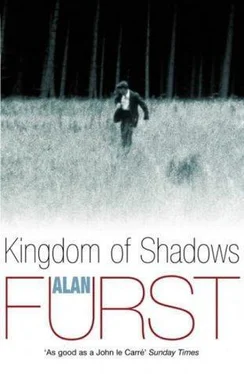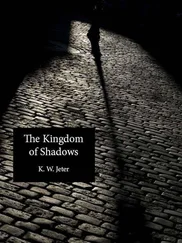Alan Furst - Kingdom of Shadows
Здесь есть возможность читать онлайн «Alan Furst - Kingdom of Shadows» весь текст электронной книги совершенно бесплатно (целиком полную версию без сокращений). В некоторых случаях можно слушать аудио, скачать через торрент в формате fb2 и присутствует краткое содержание. Жанр: Шпионский детектив, на английском языке. Описание произведения, (предисловие) а так же отзывы посетителей доступны на портале библиотеки ЛибКат.
- Название:Kingdom of Shadows
- Автор:
- Жанр:
- Год:неизвестен
- ISBN:нет данных
- Рейтинг книги:5 / 5. Голосов: 1
-
Избранное:Добавить в избранное
- Отзывы:
-
Ваша оценка:
- 100
- 1
- 2
- 3
- 4
- 5
Kingdom of Shadows: краткое содержание, описание и аннотация
Предлагаем к чтению аннотацию, описание, краткое содержание или предисловие (зависит от того, что написал сам автор книги «Kingdom of Shadows»). Если вы не нашли необходимую информацию о книге — напишите в комментариях, мы постараемся отыскать её.
Kingdom of Shadows — читать онлайн бесплатно полную книгу (весь текст) целиком
Ниже представлен текст книги, разбитый по страницам. Система сохранения места последней прочитанной страницы, позволяет с удобством читать онлайн бесплатно книгу «Kingdom of Shadows», без необходимости каждый раз заново искать на чём Вы остановились. Поставьте закладку, и сможете в любой момент перейти на страницу, на которой закончили чтение.
Интервал:
Закладка:
This would be his first full summer in France, it would find him poor and dreamy, passionate for dark, lovely corners-alleys and churches-full of schemes and opinions, in love with half the women he saw, depressed, amused, and impatient for lunch. In short, Parisian.
Die Aussicht, like all political magazines, didn’t quite live and didn’t quite die. The January issue, out in March, had featured an article by Professor Bordeleone, of the University of Turin, “Some Notes on the Tradition of the Fascist Aesthetic.” It hadn’t quite the elevated depth his readers expected, but it did have the epic sweep-reaching back into imperial Rome and snaking forward past nineteenth-century architecture to d’Annunzio. A gentle, twinkling sort of man, Bordeleone, now professor emeritus of the University of Turin, after a night of interrogation and castor oil at the local police station. But, thank God, at least Signora Bordeleone was rich, and they would survive.
For the winter issue, Adler had grand ambitions. He had received a letter from an old Konigsberg friend, Dr. Pfeffer, now an emigre in Switzerland. Dr. Pfeffer had attended a lecture in Basel, and at the coffee hour following the talk the lecturer had mentioned that Thomas Mann, himself an emigre since 1933, was considering the publication of a brief essay. For Mann, that could mean eighty pages, but Adler didn’t care. His printer, down in Saclay, was-to date, anyhow-an idealist in matters of credit and overdue bills, and, well, Thomas Mann. “I wondered aloud,” said Pfeffer in his letter, “ever so gently, whether there was any indication of a topic, but the fellow simply coughed and averted his eyes-would you ask Zeus what he had for breakfast?” Adler smiled, remembering the letter. Of course, the topic was completely beside the point. To have that name in Die Aussicht he would have published the man’s laundry bill.
He unbuckled his briefcase and peered inside: a copy of Schnitzler’s collected plays, a tablet of cheap writing paper-the good stuff stayed in his desk back in Saint Germain-en-Laye-yesterday’s Le Figaro, gathered, he thought of it as rescued, on the little train that brought him to Paris, and a cheese sandwich wrapped in brown paper. “Ah, mais oui, monsieur, le fromage de campagne!” The lady who owned the local cremerie had quickly figured out that he had no money, but, French to the bone, had a small passion for seedy intellectuals and sold him what she called, with a curious mixture of pride and cruelty, cheese of the countryside. Nameless, yellow, plain, and cheap. But, Adler thought, bless her anyhow for keeping us alive.
He took the tablet from his briefcase, hunted around until he found a pencil, and began to compose. “ Mein Herr Doktor Mann.” Could he do better with the honorific? Should he try? He let that sit, and went on to strategy. “ Mein Herr Doktor Mann: As I have a wife and four children to feed and holes in my underwear, I know you will want to publish an important essay in my little magazine.” Now, how to say that without saying it. “Perhaps not widely known but read in important circles?”
Phooey. “The most substantive and thoughtful of the emigre political magazines?”
Limp. “Makes Hitler shit!” Now, he thought, there he was on to something. What if, he thought, for one manic second, he actually came out and said such a thing?
His gaze wandered up from the paper to the deep green of chestnut trees on the other side of the pool. No children this morning, of course, they would be suffering through a June day in a schoolroom.
A stroller in the park came toward him. A young man, clearly not at work, perhaps, sadly, unemployed. Adler looked back down at his tablet until the man stood beside his chair. “Pardon, monsieur,” he said. “Can you tell me the time?”
Adler reached inside his jacket and withdrew a silver pocket watch on a chain. The minute hand rested precisely on the four.
“It is just …” he said.
M. Coupin was an old man who lived on a railroad pension and went to the park to read the newspaper and look at the girls. He told his story to the flics standing just outside the Jardin du Luxembourg, then to the detectives at the prefecture, then to a reporter from the Paris-Soir, then to two men from the Interior Ministry, and, finally, to another reporter, who met him at his local cafe, bought him a pastis, then another, seemed to know more about the event than any of the others, and asked him a number of questions he couldn’t answer.
He told them all the same story, more or less. The man sitting across from the sailboat pond, the man in the blue suit and the steel-rimmed spectacles who approached him, and the shooting. A single shot and a coup de grace.
He did not see the first shot, he heard it. “A sharp report, like a firecracker.” That drew his attention. “The man looking at his watch dropped it, then leapt to his feet, as though he had been insulted. He swayed for a moment, then toppled over, taking the chair with him. His foot moved once, after that he was still. The man in the blue suit leaned over him, aimed his pistol, and fired again. Then he walked away.”
M. Coupin did not shout, or give chase, or anything else. He stayed where he was, motionless. Because, he explained, “I could not believe what I had seen.” And further doubted himself when the assassin “simply walked away. He did not run. He did not hurry. It was, it was as though he had done nothing at all.”
There were other witnesses. One described a man in an overcoat, another said there were two men, a third reported a heated exchange between the assassin and the victim. But almost all of them were farther away from the shooting than M. Coupin. The exception was a couple, a man and a woman, strolling arm in arm on a gravel path. The detectives watched the park for several days but the couple did not reappear, and, despite a plea in the story that ran in the newspapers, did not contact the prefecture.
“Extraordinary,” Count Polanyi said. He meant a soft waffle, folded into a conical shape so that a ball of vanilla ice cream rested on top. “One can eat it while walking.”
Morath had met his uncle at the zoo, where a glacier by the restaurant offered the ice cream and waffle. It was very hot, Polanyi wore a silk suit and a straw hat. They strolled past a llama, then a lion, the zoo smell strong in the afternoon sun.
“Do you see the papers, Nicholas, down there?”
Morath said he did.
“The Paris papers?”
“Sometimes Figaro, when they have it.”
Polanyi stopped for a moment and took a cautious taste of the ice cream, holding his pocket handkerchief under the small end of the waffle so that it didn’t drip on his shoes. “Plenty of politics, while you were away,” he said. “Mostly in Czechoslovakia.”
“I read some of it.”
“It felt like 1914-events overtaking politicians. What happened was this: Hitler moved ten divisions to the Czech border. At night. But they caught him at it. The Czechs mobilized-unlike the Austrians, who just sat there and waited for it to happen-and the French and British diplomats in Berlin went wild. This means war! In the end, he backed down.”
“For the time being.”
“That’s true, he won’t give it up, he hates the Czechs. Calls them ‘a miserable pygmy race without culture.’ So, he’ll find a way. And he’ll pull us in with him, if he can. And the Poles. The way he’s going to sell it, we’re simply three nations settling territorial issues with a fourth.”
“Business as usual.”
“Yes.”
“Well, down where I was, nobody had any doubts about the future. War is coming, we’re all going to die, there is only tonight …”
Читать дальшеИнтервал:
Закладка:
Похожие книги на «Kingdom of Shadows»
Представляем Вашему вниманию похожие книги на «Kingdom of Shadows» списком для выбора. Мы отобрали схожую по названию и смыслу литературу в надежде предоставить читателям больше вариантов отыскать новые, интересные, ещё непрочитанные произведения.
Обсуждение, отзывы о книге «Kingdom of Shadows» и просто собственные мнения читателей. Оставьте ваши комментарии, напишите, что Вы думаете о произведении, его смысле или главных героях. Укажите что конкретно понравилось, а что нет, и почему Вы так считаете.












